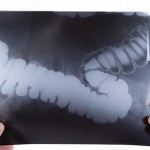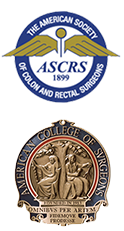Diagnostic Tests

Genetic Testing for Colon Cancer
Up to a third of colon cancer cases exhibit a moderate form of inheritance. There are certain families in which colorectal cancer occurs much more frequently than would be expected by pure chance. It appears that these patients have been born with one of the abnormal (“mutated”) genes already present in each of their cells. This makes the likelihood of collecting the additional random mutations that can lead to cancer much less of a rarity. Members of such a family carry a higher risk of developing colon cancer, often at an early age.
It has been shown that having a first-degree relative (parent, brother, sister or child) with colorectal cancer doubles the risk of developing cancer. For this reason, a detailed family history will be obtained during the visit – please have information regarding any cancers and the age of diagnosis for all family members. There should be concern if a family has more than one relative with colorectal cancer or if the relative developed that cancer before the age of 50. In some cases, genetic testing for polyposis colon cancer syndromes or non-polyposis colon cancer syndromes may be warranted.
Imaging
 In addition to taking a detailed history of your problem followed by a careful physical examination, further studies may be ordered to assist in your evaluation and subsequent treatment. Because the disease processes we treat are surgical in nature, radiologic studies to clarify anatomy are the most common. This would include ultrasounds, CT (computed tomography) scans, MRI (magnetic resonance imaging), and PET (positron emission tomography).
In addition to taking a detailed history of your problem followed by a careful physical examination, further studies may be ordered to assist in your evaluation and subsequent treatment. Because the disease processes we treat are surgical in nature, radiologic studies to clarify anatomy are the most common. This would include ultrasounds, CT (computed tomography) scans, MRI (magnetic resonance imaging), and PET (positron emission tomography).
CT scan
A CT (computed tomography) scan or CAT (computed axial tomography) scan is an x-ray study of the body, typically the abdomen and pelvis to evaluate a variety of complaints and disease states. Unlike traditional x-rays, a CT will provide detailed anatomic information about all of the abdominal and pelvic organs. It can be ordered to evaluate abdominal pain, a bowel obstruction, diverticulitis, inflammatory bowel disease or colorectal cancer among other diseases. The test is frequently administered with an iodine-based, IV contrast as well as an oral contrast. If you have a known allergy to iodine or shellfish, have impaired kidney function or take oral hypoglycemic, such as metformin for diabetes it is important to inform your doctor prior to having the test scheduled. A CT scan is frequently performed on an outpatient basis, although hospital in-patients can also have it done.
MRI
MRI stands for magnetic resonance imaging. Like with ultrasounds, there is no radiation given with this test. A powerful magnet is used to align the atomic nuclei in the body, typically focusing on water and fat content in the various tissues. Like a CT scan, the MRI is typically used to provide detailed images of the abdominal and pelvic organs and structures. Like a CT scan it can also be used to evaluate a variety of disease states and complaints, however, the images take longer to obtain and the test is administered in a long tube. If you have claustrophobia, you need to discuss this with the doctor before your test is scheduled.
Ultrasound
An ultrasound is a study performed using high-frequency sound waves to study local anatomy. This test does not involve any radiation. Because the sound waves cannot penetrate that deeply into the body, this test can only evaluate structures that are near an accessible surface, such as the abdominal wall. It is also used for local evaluation of the rectal wall and the anal canal. These tests are called a rectal ultrasound and an anal ultrasound. The rectal ultrasound is generally used for pre-treatment staging of rectal cancers, while the anal ultrasound is used to evaluate anal sphincter muscle anatomy for fecal incontinence or complex peri-rectal fistulae.
 For more information on our Diagnostic Tests, or to schedule an appointment, please complete our online form or call 410-573-1699.
For more information on our Diagnostic Tests, or to schedule an appointment, please complete our online form or call 410-573-1699.





